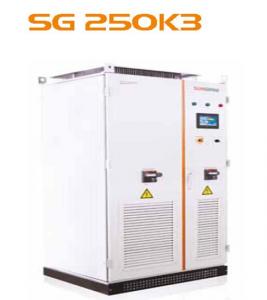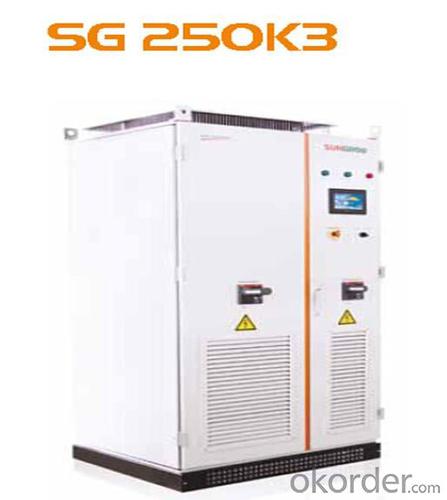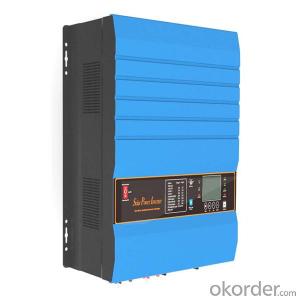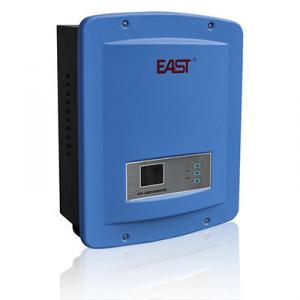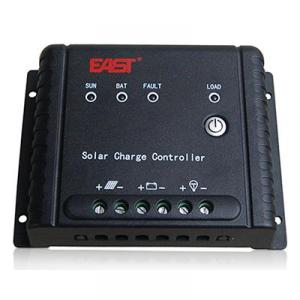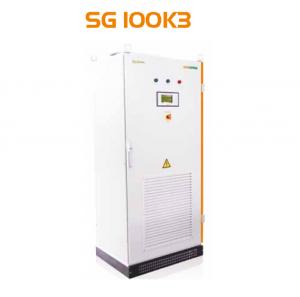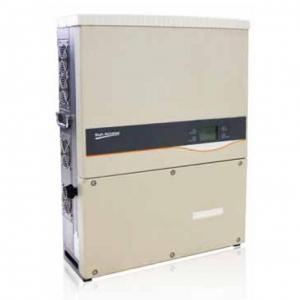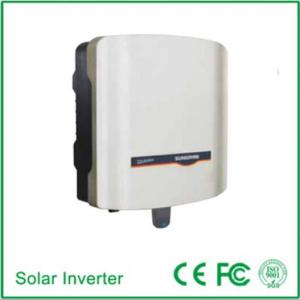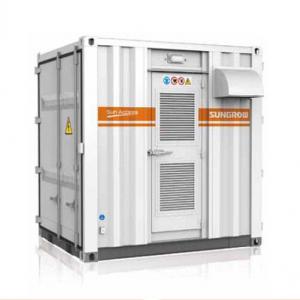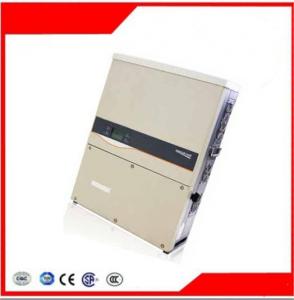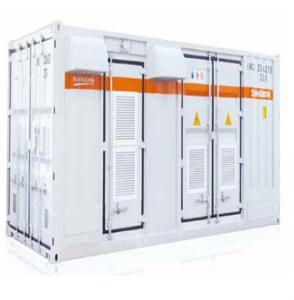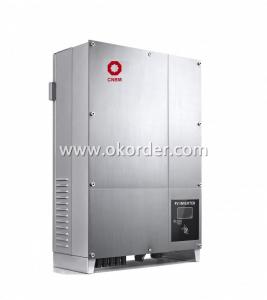UPS as Solar Inverter Photovoltaic Grid-Connected Inverters SG250K3
- Loading Port:
- China Main Port
- Payment Terms:
- TT or LC
- Min Order Qty:
- 500000 unit
- Supply Capability:
- 3000000 unit/month
OKorder Service Pledge
OKorder Financial Service
You Might Also Like
1. Structure of Photovoltaic Grid-Connected Inverters SG250K3 Description
SG630KTL is using low-frequency isolation transformer for protective purpose. Its wider input voltage range ensures more combinations of
the PV arrays. Moreover, optical fiber isolation technology has been adopted to increase its anti-interference ability under the circumstances
of multiple inverters installation. In addition, optimized circuit and structural design has improved system thermal efficiency which enhancing
system reliability and stability. Reinforced protection functions, including the DC ground fault protection, make it the best product for large
scale PV power plant.
2. Main Features of the Photovoltaic Grid-Connected Inverters SG250K3
* Advanced Technology, Grid-friendly
• LVRT, HVRT and zero-voltage ride through to cope with various grid conditions
• SVG function at night, response to grid directives around the clock
• Reactive power control with power factor from 0.9 lagging to 0.9 leading
* More Compact, Saving Space for PV Plant
• Power density enhanced 50%, one of the central inverters with highest power density in the PV industry
• Save installation spaces and lower the plant initial cost
• Front maintenance, able to install against the wall, convenient installation and maintenance, saving operation cost of the PV plant.
* Efficient, More Yields
• Max. efficiency at 97.3% with transformer
• Efficient MPPT control strategy, improve power yields
• 28335 chips adopted, more accurate calculation, more power yields;
• Intelligent speed regulation cooling concept, low consumption, high efficiency
* More Advantages
• Perfect protection and fault alarm system, safe and reliable
• User-friendly dynamic graphics LCD
• Redundant dual power supply solution improving the system reliability
• Efficient PWM algorithm, low consumption of switch
• Operate without power derating at -25℃ - +55℃
• Reliable and continues operation in high altitude environment
• Auxiliary heater (opt.)
• CGC certification, compliance with BDEW
3. Photovoltaic Grid-Connected Inverters SG250K3 Images
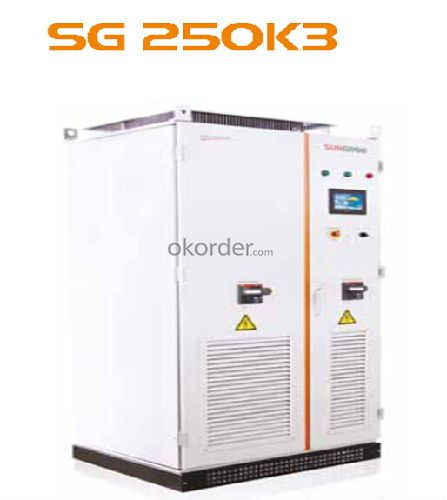
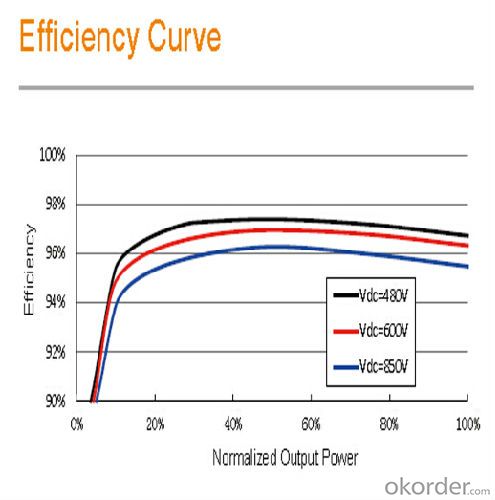

4. Photovoltaic Grid-Connected Inverters SG250K3 Specification
MODEL | SG250K3 |
DC SIDE DATA | |
Max. DC Voltage | 1000Vdc |
Start Voltage | 500V |
MPP Voltage Range | 480~850Vdc |
Min. DC Voltage | 480V |
Max. DC Power | 284kWp |
Max. Input Current | 592A |
AC SIDE DATA | |
Rated Output Power | 250kW |
Max. AC Output Current | 397A |
Rated Grid Voltage | 400Vac |
Grid Voltage Range | 310~450Vac |
Rated Grid Frequency | 50Hz/60Hz |
Grid Frequency Range | 47~52Hz/57~62Hz |
Output Current THD | <3% (at nominal power) |
DC Current Injection | <0.5% of rated inverter output current |
Power Factor | 0.9(lagging)~0.9(leading) |
SYSTEM | |
Max. Efficiency | 97.3%(with transformer) |
Euro Efficiency | 96.7%(with transformer) |
Protection Degree | IP21 |
Power Consumption at Night | <80W |
Operating Temperature | -25~+55°C |
Cooling Method | Temperature controlled forced-air cooling |
Relative Humidity | 0~95%, non-condensing |
Max. Working Altitude | 6000m (operation with derating above 3000m) |
DISPLAY AND COMMUNICATIONS | |
Display | touch screen LCD |
Standard Comm. Interfaces | RS485 |
Optional Comm. Interfaces | Ethernet |
MECHANICAL DATA | |
Dimensions(WxHxD) | 1006x2034x850mm |
Net Weight | 1600kg |
5. FAQ of Photovoltaic Grid-Connected Inverters SG250K3
Q1. What is the difference between inverter and solar inverter?
A1. Inverter only has AC inpput, but solar inverter both connect to AC input and solar panel, it saves more power.
Q2. What is the difference between MPPT&PWM?
A2. MPPT has higher efficiency, it can track the max power point and won't waste energy.
- Q: How does a solar inverter handle variations in ambient temperature?
- A solar inverter handles variations in ambient temperature by incorporating temperature compensation mechanisms. These mechanisms allow the inverter to adjust its operation and optimize performance based on the temperature conditions. By monitoring the temperature, the inverter can regulate voltage levels, adjust power outputs, and protect itself from overheating. This ensures that the inverter operates efficiently and reliably under different ambient temperature conditions.
- Q: Can a solar inverter be used with a smart home automation system?
- Yes, a solar inverter can be used with a smart home automation system. Many modern solar inverters are equipped with communication interfaces such as Wi-Fi or Zigbee, allowing them to integrate seamlessly with smart home automation systems. This integration enables homeowners to monitor and control their solar energy production, consumption, and storage remotely, and optimize their energy usage for increased efficiency and cost savings.
- Q: Are there any electromagnetic interference concerns associated with solar inverters?
- Yes, there are electromagnetic interference (EMI) concerns associated with solar inverters. Solar inverters convert the direct current (DC) generated by solar panels into alternating current (AC) that can be used to power homes and businesses. During this conversion process, high frequency switching occurs, which can generate EMI. EMI refers to the disturbance caused by electromagnetic radiation from electronic devices, which can interfere with the proper functioning of other electronic devices in close proximity. In the case of solar inverters, the EMI generated can potentially affect nearby electronic equipment, such as radios, televisions, or communication systems. To mitigate these concerns, solar inverter manufacturers often comply with relevant EMI standards and regulations. These may include limits on the amount of electromagnetic radiation emitted by the inverters and the use of shielding materials to reduce EMI. Additionally, some inverters incorporate filters or other EMI suppression techniques to minimize the interference created. It is important for solar installers and system designers to consider EMI concerns when selecting and positioning solar inverters. Proper installation and grounding techniques can help reduce EMI issues. Additionally, local regulations and guidelines should be followed to ensure compliance with EMI standards and to minimize potential interference with other electronic devices. Overall, while there are EMI concerns associated with solar inverters, proper design, installation, and adherence to relevant standards can effectively mitigate these concerns and ensure the smooth operation of both the solar system and other electronic equipment in the vicinity.
- Q: What is the role of a grid monitoring feature in a solar inverter?
- The role of a grid monitoring feature in a solar inverter is to constantly monitor the electrical grid to ensure that the solar energy being produced by the inverter is compatible with the grid's requirements. It helps in maintaining the stability and reliability of the grid by detecting any abnormalities or fluctuations in voltage or frequency. Additionally, it allows the inverter to automatically disconnect from the grid in case of a grid failure or disturbance, providing safety and protection to both the solar system and the grid.
- Q: Can a solar inverter be used with a solar-powered water pump?
- Yes, a solar inverter can be used with a solar-powered water pump. A solar inverter converts the direct current (DC) generated by solar panels into alternating current (AC) that can be used to power various electrical devices, including water pumps. This allows the solar panels to directly power the water pump, making it an efficient and sustainable solution for water pumping applications.
- Q: PV grid-connected inverter and independent inverter in the control of what is the difference
- The independent inverter in the output voltage phase amplitude of the frequency control is initially set good. Independent inverter, you should refer to off-grid inverter, do not need to consider the grid situation.
- Q: What is the difference between a PV inverter and a solar inverter?
- The main function of photovoltaic grid-connected inverter is to convert the DC power of the solar PV module into the same frequency as the sinusoidal AC power of the grid (the grid is generally AC power grid, DC can not be directly connected)
- Q: Can a solar inverter be used in a solar water pumping system?
- Yes, a solar inverter can be used in a solar water pumping system. The inverter is responsible for converting the direct current (DC) generated by the solar panels into alternating current (AC) required to power the water pump. This allows for efficient and reliable operation of the pumping system using solar energy.
- Q: Can a solar inverter be used with different types of energy management systems?
- Yes, a solar inverter can be used with different types of energy management systems. Solar inverters are designed to convert the direct current (DC) generated by solar panels into alternating current (AC) that can be used to power various electrical devices. They are compatible with different energy management systems, including grid-tied systems, off-grid systems, and hybrid systems. The inverter's main function is to ensure the efficient and safe conversion of solar energy, regardless of the type of energy management system it is paired with.
- Q: What is the maximum AC power output of a solar inverter?
- The maximum AC power output of a solar inverter varies depending on the specific model and capacity. It can range from a few hundred watts for small residential inverters to several megawatts for large commercial or utility-scale inverters.
Send your message to us
UPS as Solar Inverter Photovoltaic Grid-Connected Inverters SG250K3
- Loading Port:
- China Main Port
- Payment Terms:
- TT or LC
- Min Order Qty:
- 500000 unit
- Supply Capability:
- 3000000 unit/month
OKorder Service Pledge
OKorder Financial Service
Similar products
Hot products
Hot Searches
Related keywords
